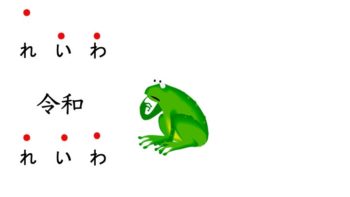Flattening Accents Posted by eriko1 on Mar 15, 2021 in Culture, Language, Pronunciation
I have been always interested in teenage vernacular (特有の言葉 tokuyu no kotoba). My senior thesis was on the teenage vernacular in Southern California. Teenagers are experts (専門家senmonka) in creating new words as they are not bound by rules. They are creative in any language.
Some new words are born and die, while others gain status to be used on TV even on the news, lose the hipness, and are abandoned by the young creators. One of the significant changes I noticed in the 1990s was a change in accent in some vocabularies. Note that the conventional accents described here are ones used in Tokyo. Young people have started to flatten accents. This trend is called “flattening accents” (アクセントの平板化 akusento no heibanka.) Some words added a new meaning by altering the traditional accents (Table 1).
Table 1
| Vocabulary | Original Accents | Original Meaning(s) | New Accents | New Meaning |
|---|---|---|---|---|
| クラブ(club) | ク\ラブ | - an organization that is created by people with a common interest - an expensive drinking venue catered to corporate executives | クラブ¯ | a hip dance club popular among hip young people |
| ネット(net) | ネ\ット | a device to catch fish etc | ネット¯ | internet |
| ライン(line) | ラ\イン | a straight one- dimensional figure | ライン¯ | The largest SNS in Japan |
While Table 2 shows vocabularies that young people simply changed the traditional accents without altering or adding meanings.
(Table 2)
| Vocabulary | Original Accents | New Accents | Meaning |
|---|---|---|---|
| ショップ(shoppu) | ショ\ップ | ショップ¯ | shop |
| モデル(moderu) | モ\デル | モデル¯ | model |
| グーグル(guuguru) | グ\ーグル | グーグル¯ | |
| 彼氏(kareshi) | か\れし | かれし¯ | boyfriend |
| 図書館(toshokan) | としょ\かん | としょかん¯ | library |
NHK Broadcasting Culture Research Institute, a research arm established by NHK (Japanese public broadcaster,) added acceptable accents of 3300 words in 2016 based on “appropriateness” in broadcasting instead of correct/incorrect.
Not surprisingly, the flattening accents are more prevailed and accepted among young people. As a former sociolinguistics student, I have no problem accepting changes in language especially the changes that involve more than accents as in Table 1. However, some changes in accents are hard even to say! レ\タス(lettus retasu) isレタス¯ and メ\ニュー (menu) can be メニュー¯. As a Tokyoite for generations, they sound like regional dialects (方言 hougen)!
Another aspect is that a group of people who shares a profession or interest chooses to use terminology with flattened accents. It is called Professional Accents (専門家アクセントsenmonka akusento). For instance, musicians may say ドラム¯ (drum, doramu) instead of ド\ラム、and ギター¯ instead of ギ\ター (guitar, gita-). This is like how teenagers identify themselves as a group by using a word and expression that they develop.
Lastly, we are in the Reiwa 3 (令和 Reiwa). There was a discussion where the accent was in Reiwa. Is it れ\いわ or れいわ¯?Every broadcasting company was debating how to announce it. According to the Japanese government, only kanji and reading of the era are fixed, and accent and intonation are free to interpret.
The bottom is the flattening accent. “わ” in れいわ has a slightly stress.
I understand that there are many who disapprove of the trend, but the language is alive and changing all the time. This trend may continue and spread to more words, or this trend may end and reverse its course. Only time will tell.

Build vocabulary, practice pronunciation, and more with Transparent Language Online. Available anytime, anywhere, on any device.




